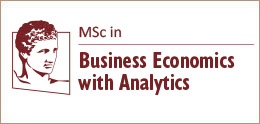Career
Professional Horizons and Employment of Graduates
Economic Consultant
Economic consultants use analytical and research skills to conduct studies of alternative economic scenarios. They analyze trends in industry, in commerce and in the markets in order to help businesses to improve their performance. They can be employed in industry and education, in businesses, in governmental and non-governmental organizations, and elsewhere.
Economic consultants may also serve as expert witnesses in legal cases to assess economic damages, to analyze intellectual property rights and antitrust violations, to address regulatory violations in the context of supervising authorities (central banks, competition commission, regulatory authorities for energy and telecommunications).
Strategist
Strategy is vital to the growth and success of a business. In large companies, strategic planners are involved in shaping and implementing the organization’s strategy. Strategic analysts use information and data – and, depending on the circumstances, artificial intelligence – to make decisions in order to achieve the desired results. They are also in a position to create a sustainable commercial advantage, applying innovative and quantified ideas. Strategic analysts maximize the value per customer by recognizing highly relevant products and sales offers for prospective and current buyers. They approach customers through alternative channels and increase the productivity of advertising and marketing media through artificial intelligence.
Credit Analyst
Credit analysts conduct microeconomic analyses of prospective clients in order to assess the risks involved in lending capital to them or to businesses. They take into account economic trends and factors which affect the region, the industries and the competitors of the potential borrowers.
Credit analysts prepare reports which summarize their findings and recommend interest rates which are appropriate for the risk profile of the clients.
Financial Analyst
Financial analysts can be employed in the research departments of companies, in financial companies which invest in and analyze stocks, derivatives, bonds and other investment instruments. Their analyses often require advanced quantitative and econometric skills.
These analysts often use computing software and models to aid in their analyses. They write reports and prepare presentations for colleagues and clients who make the final decisions with regard to investments, stock/bond offers and mergers and acquisitions.
Market Research Analyst
Market research analysts study the trends in industry, in commerce and in the financial sector to assess the way in which products or services could perform under different economic conditions. They are trained in designing studies and analyzing data. They must be in a position to quantify the results and to present this information to the clients.
These analysts apply many of the skills that they develop in the core economics courses, such as the use of presentation and graphics software, as well as writing and statistics skills. They must exercise critical thinking and be proficient in problem solving.
Management Consultant
Management consultants analyze business problems and look for possible solutions to present to clients. Recent graduates often start out in positions such as research analyst, research assistant, or junior consultant, where they support the work of personnel who are more senior in the hierarchy. Over time they can be promoted to positions such as management consultant.
The study of economics provides an excellent foundation in the financial and quantitative modeling which is used by consultants in order to carry out their analyses. Writing and presentation skills are also essential for the preparation of reports and the submission of recommendations to clients.
Policy Analyst
Policy analysts research and analyze issues that affect the public. They can be employed as advisers in governmental and international organizations in areas such as healthcare, taxation, energy, the environment, and international trade policy.
Policy analysts rely on quantitative analysis and writing skills to present their findings and to convince legislators and the public of the viability of their recommendations.
Actuary
Actuaries use advanced mathematical and statistical/econometric methods to determine the probability of events such as fires, deaths, illnesses, and business failures. They need to take into account a large number of variables when analyzing risk profiles and possible economic losses in order to create a profitable structure for contracts.
Actuaries often use software to assist in their analyses. They devise graphs to convey their decisions to members of the management team.


